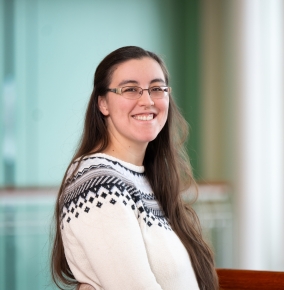Catherine Lockton

When did you join the Laboratory, and what made you decide to pursue a career here?
I joined the Laboratory in late 2021, right after finishing graduate school. I sought a place that allowed its employees a certain amount of intellectual freedom. Working here has given me the chance to explore my field of optical communications with enough latitude to delve deeply into some topics while mastering only the fundamentals for other less-familiar topics. This work style is exceptionally fulfilling for me; I never get bored. With my background in digital signal processing, I was also aware of the Laboratory’s legacy in highly impactful signal processing research, so I was excited to work alongside and learn from leaders in this area.
What does a typical day at the Laboratory look like?
I'm typically on site for most of the day and work from home in the evening. This schedule affords me valuable interactions with my colleagues and time with my son, and the break leads to a more efficient path to solutions. When problems "marinate" in my brain, I often arrive at answers more quickly than I would have otherwise.
A primary focus of mine has been building a strong knowledge base in digital optical communications. One program I’m working on is developing a highly flexible optical modem against which other optical modems will be tested. Another is exploring ways of modifying commercial optical transceiver technology to operate at data rates outside those it was designed for. Recently, I helped align optical components for a program working on quantum memory systems.
To gain an understanding of fundamental concepts, I spend time reading textbooks. Though I can "turn the crank" mathematically to work my way through the mechanics of a communication link, I would very much like to develop intuition around why waveforms are designed the way they are or how certain system architecture choices impact overall performance. I also conduct MATLAB simulations and talk to FPGA [field-programmable gate array] and photonics engineers. These engineers explain how hardware is tested and validated, which further helps identify the system-level tests needed to ensure that we have met our original requirements.
Who or what inspires you?
My group members are extremely collegial. They are generous with their time and expertise, and I am buoyed by their enthusiasm for their own projects, too. They frequently offer me at least an hour of dedicated whiteboard time, a lab tour, or an open invitation to ask any further questions in the future — or all three of the above. Their considerable knowledge and kindness toward a new member of the team both inspire me. One of my goals is to be this person for others.
Beyond my group, I have found a wonderful community in LLSPEAKS, the Laboratory's public speaking ERG [employee resource group]. The club encourages both prepared and extemporaneous speeches, presented in an informal and accepting environment. Because of LLSPEAKS, I am more comfortable in attending casual gatherings, participating in meetings, and giving presentations. I have also made close personal friends.
What is your favorite travel destination?
My favorite destination is Hawaii to visit my mom's family. My grandma, aunts, uncle, and several cousins all live there, and I have really happy memories of visiting them in the summertime when my sisters and I were kids. Everything about going there is nostalgic — the food, the plants, the people, the beaches, and even the high school hills where I first learned to sled, albeit on cardboard boxes and sans snow.